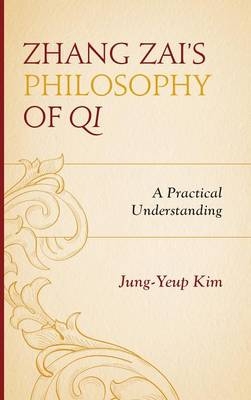
Zhang Zai's Philosophy of Qi
A Practical Understanding
Seiten
2015
Lexington Books (Verlag)
978-0-7391-9236-8 (ISBN)
Lexington Books (Verlag)
978-0-7391-9236-8 (ISBN)
Qi (“vital energy”) is one of the most important concepts in Chinese philosophy and culture, and neo-Confucian Zhang Zai plays a pivotal role in developing the notion. This book provides a thorough and proper understanding of his thoughts.
Qi 氣 (“vital energy”) is one of the most important concepts in Chinese philosophy and culture, and neo-Confucian Zhang Zai (1020-1077) plays a pivotal role in developing the notion. An investigation of his philosophy of qi is not confined to his particularity, but sheds light upon the notion of qi as it is understood within Chinese and East Asian thought in general. Yet, his position has not been given a thorough philosophical analysis in contemporary times. The purpose of this book is to provide a thorough and proper understanding of Zhang Zai’s philosophy of qi. Zhang Zai’s Philosophy of Qi: A Practical Understanding focuses on the practical argument underlying Zhang Zai’s development of qi that emphasizes the endeavor to create meaningful coherence amongst our differences through mutual communication and transformation. In addition to this, the book compares and engages Zhang Zai’s philosophy of qi with John Dewey’s philosophy of aesthetic experience in order to make Zhang Zai’s position more plausible and relevant to the contemporary Western audience.
Qi 氣 (“vital energy”) is one of the most important concepts in Chinese philosophy and culture, and neo-Confucian Zhang Zai (1020-1077) plays a pivotal role in developing the notion. An investigation of his philosophy of qi is not confined to his particularity, but sheds light upon the notion of qi as it is understood within Chinese and East Asian thought in general. Yet, his position has not been given a thorough philosophical analysis in contemporary times. The purpose of this book is to provide a thorough and proper understanding of Zhang Zai’s philosophy of qi. Zhang Zai’s Philosophy of Qi: A Practical Understanding focuses on the practical argument underlying Zhang Zai’s development of qi that emphasizes the endeavor to create meaningful coherence amongst our differences through mutual communication and transformation. In addition to this, the book compares and engages Zhang Zai’s philosophy of qi with John Dewey’s philosophy of aesthetic experience in order to make Zhang Zai’s position more plausible and relevant to the contemporary Western audience.
Jung-Yeup Kim is assistant professor of philosophy at Kent State University.
Chapter One: Introducing the Notion Qi, the Philosopher Zhang Zai, and the Text Zhengmeng (Rectifying the Ignorant)
Chapter Two: Zhang Zai’s Critique of the Buddhist
Chapter Three: Zhang Zai’s Vertical Development of Qi and His Critique of the Buddhist
Chapter Four: Zhang Zai’s Critique of the Ordinary Person
Chapter Five: Zhang Zai’s Horizontal Development of Qi and His Critique of the Ordinary Person
Chapter Six: Zhang Zai and John Dewey on Realizing Vital Harmony
Chapter Seven: Zhang Zai and Sŏ Kyŏngdŏk’s Philosophy of Qi
| Erscheint lt. Verlag | 6.3.2015 |
|---|---|
| Verlagsort | Lanham, MD |
| Sprache | englisch |
| Maße | 162 x 238 mm |
| Gewicht | 331 g |
| Themenwelt | Geisteswissenschaften ► Philosophie ► Östliche Philosophie |
| Geisteswissenschaften ► Religion / Theologie ► Weitere Religionen | |
| ISBN-10 | 0-7391-9236-1 / 0739192361 |
| ISBN-13 | 978-0-7391-9236-8 / 9780739192368 |
| Zustand | Neuware |
| Haben Sie eine Frage zum Produkt? |
Mehr entdecken
aus dem Bereich
aus dem Bereich


